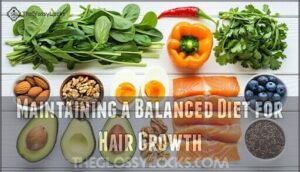This site is supported by our readers. We may earn a commission, at no cost to you, if you purchase through links.

This condition affects up to 53% of people consuming under 1,200 calories daily, pushing hair follicles into a resting phase about 3-6 months after rapid weight changes.
Your hair isn’t gone forever—it’s just taking an extended break.
The key lies in correcting nutritional deficiencies that crash diets create, particularly iron, zinc, and protein shortages that starve your follicles.
Smart supplementation and balanced nutrition can jumpstart your hair’s comeback story faster than waiting it out alone.
Table Of Contents
- Key Takeaways
- Weight Loss and Hair Loss
- Nutritional Deficiencies and Hair Growth
- Preventing Hair Loss After Weight Loss
- Hair Growth After Weight Loss Surgery
- Facilitating Hair Regrowth After Weight Loss
- Maintaining Healthy Hair After Weight Loss
- Frequently Asked Questions (FAQs)
- Will losing weight regrow hair?
- Can eating too little fat cause hair loss?
- Is hair loss from malnutrition reversible?
- How long does it take for a diet to repair hair?
- How long does hair loss after weight loss last?
- Can hair loss after weight loss be permanent?
- What are the best supplements for hair regrowth?
- How can stress management help prevent hair loss?
- What lifestyle changes can promote hair growth?
- Do certain medical conditions slow hair recovery?
- Conclusion
Key Takeaways
- Your hair loss is temporary – Weight loss triggers telogen effluvium, affecting up to 53% of people who eat under 1,200 calories daily, but recovery typically occurs within 6-9 months once you restore proper nutrition.
- Fix nutritional deficiencies first – Focus on iron (if ferritin’s below 40ug/L), zinc, and protein intake, since crash diets starve your follicles of essential nutrients needed for healthy growth cycles.
- You’ll need patience for regrowth – Hair typically starts recovering 2-3 months after improving nutrition, but full restoration takes 6-12 months as follicles shift from resting to active growth phases.
- Avoid crash diets to prevent future loss – Maintain balanced nutrition with adequate calories, stay hydrated, manage stress levels, and choose gradual weight loss over extreme restrictions to protect your hair long-term.
Weight Loss and Hair Loss
When you lose weight rapidly, you’re setting yourself up for a frustrating side effect that mightn’t show up until months later—hair loss.
Your body treats sudden weight changes as stress, which can push hair follicles into a resting phase called telogen effluvium, causing noticeable thinning around three to six months after your initial weight drop.
Telogen Effluvium and Its Causes
Following sudden weight loss, your hair follicles can shift into telogen effluvium, where stress and hormonal shifts disrupt normal growth cycles.
This condition causes widespread hair shedding three to six months after your weight reduction.
Illness and TE often coincide, while medication effects may compound the problem.
Understanding TE duration helps manage expectations during recovery.
Impact of Crash Dieting on Hair Growth
Crash diets wreak havoc on your hair follicles by triggering severe calorie restriction and nutritional deficiencies hair loss.
Extreme calorie restriction starves your hair follicles of essential nutrients they desperately need
When you drastically cut calories, your body enters survival mode, disrupting nutrient absorption and creating hormonal imbalance that shifts hair into the shedding phase.
Here’s what happens during extreme dieting:
- Stress response floods your system with cortisol, accelerating temporary shedding
- Iron and zinc depletion starves follicles of essential growth minerals
- Protein deficiency weakens hair structure, causing breakage and thinning
- Rapid weight loss hair loss begins 3-6 months after starting restrictive diets
- Telogen effluvium weight loss affects up to 53% of people consuming under 1,200 calories daily.
This dieting hair loss typically resolves within a year once you restore proper nutrition.
Relationship Between Weight Loss Surgery and Hair Loss
Weight loss surgery creates a perfect storm for hair loss.
Approximately 57% of bariatric surgery patients experience telogen effluvium within six months.
Surgical stress combined with rapid weight reduction triggers hair follicles into resting phase.
Malabsorption effects from bariatric procedures often cause nutritional deficiencies in iron, zinc, and protein—essential nutrients your hair desperately needs.
Fortunately, supplement strategies can address bariatric deficiencies and support long-term regrowth.
Hair loss following the procedure, known as Bar SITE, can affect 20% to 50% of patients.
Nutritional Deficiencies and Hair Growth
When you lose weight rapidly, your body often can’t keep up with providing essential nutrients to your hair follicles.
This nutritional shortfall directly impacts hair growth cycles, causing increased shedding and slower regrowth that can persist for months after your weight loss journey, affecting your overall regrowth.
Importance of Iron and Zinc for Hair Growth
Beyond adequate calories, iron and zinc serve as your hair’s foundation. Iron deficiency hair loss strikes when ferritin levels drop below 40ug/L, while zinc deficiency hair creates brittle strands and slower growth.
Individuals can explore supplements for hair to potentially address deficiencies.
Here’s what these minerals do for you:
- Iron absorption delivers oxygen to follicles, preventing telogen effluvium
- Zinc benefits include follicle repair and keratin production
- Deficiency symptoms appear as excessive shedding and weak hair texture
- Dietary sources like red meat, shellfish, and nuts restore healthy levels
Role of Protein in Hair Growth and Maintenance
Protein serves as the building block for keratin production, the primary structural component of your hair strands.
Without adequate protein intake, your hair follicles can’t synthesize the amino acids necessary for strong, healthy growth.
Protein deficiency hair loss occurs when your body diverts available protein to essential organs, leaving follicles weakened.
Quality protein sources like lean meats, eggs, and legumes provide the complete amino acid profile your hair needs to maintain strength and prevent breakage during weight loss, ensuring strong, healthy growth and prevent breakage.
Other Essential Nutrients for Hair Growth
Your body needs more than protein to rebuild healthy hair after weight loss.
Vitamin D supports follicle cycling, while B vitamins like Biotin and Folic Acid fuel cellular growth. Omega-3s strengthen hair structure, and Vitamin C aids nutrient absorption.
Key micronutrients for hair growth include:
- Vitamin D – Regulates follicle phases from resting to growth
- B-complex vitamins – Power cell division in hair matrix, especially biotin and folate
- Omega-3 fatty acids – Build strong keratin and reduce scalp inflammation
- Vitamin C – Enhances iron absorption and collagen production for follicle health
- Essential minerals – Selenium, copper, and magnesium support enzyme functions that maintain growth cycles
Biotin deficiencies can cause thinning or hair loss.
How to Identify Nutrient Deficiencies
Catching deficiency symptoms early makes all the difference in your weight loss hair loss journey.
Blood tests reveal ferritin levels below 40ug/L and zinc deficiencies that trigger hair thinning.
Physical exams detect brittle strands and scalp changes, while diet analysis exposes vitamin deficiency hair loss patterns.
Your doctor can evaluate supplement needs and identify micronutrients gaps causing nutritional deficiencies affecting your hair’s health.
Preventing Hair Loss After Weight Loss
You can take proactive steps to prevent hair loss during your weight loss journey by maintaining proper nutrition and avoiding extreme dietary restrictions.
The key is balancing your caloric deficit with adequate intake of essential nutrients like iron, zinc, and protein to keep your hair follicles healthy throughout the process.
Maintaining a Balanced Diet for Hair Growth
Fueling your follicles requires strategic nutrition for hair growth after weight loss.
Your healthy hair diet should include diverse protein sources and essential micronutrients that support regrowth.
Focus on these balanced meals components:
- Dietary Diversity – Include colorful vegetables, lean meats, and whole grains
- Protein Sources – Eggs, fish, legumes, and dairy for keratin production
- Micronutrient Intake – Iron-rich spinach, zinc from nuts, biotin from avocados
- Hydration Benefits – Eight glasses daily for peak scalp circulation
This approach guarantees your macronutrients and nutrition work together effectively.
Avoiding Crash Diets and Restrictive Eating
Crash diets create a perfect storm for hair shedding after dieting.
When you slash calorie intake below 1,200 daily, you’re basically starving your hair follicles of essential nutrients.
Sustainable nutrition beats rapid weight loss every time—your scalp needs consistent fuel, not feast-or-famine cycles.
A balanced approach with gradual weight loss protects against nutrient deficiency while maintaining healthy habits that support long-term hair growth after weight loss, and it’s clear that sustainable nutrition is key, and consistent fuel is necessary for healthy hair.
Importance of Staying Hydrated for Hair Health
Proper hydration acts like a lifeline for your hair follicles, delivering nutrients directly to your scalp and maintaining ideal follicle function.
When you’re well-hydrated, your hair shows improved elasticity and strength, making it less prone to breakage during your weight loss journey.
Here’s how hydration transforms your hair health:
- Scalp moisture increases by 40% when you drink 8+ glasses daily, creating the perfect environment for hair growth
- Hair elasticity improves dramatically with proper water intake, reducing snap-off and brittleness by up to 30%
- Follicle function operates at peak efficiency when hydrated, pumping out stronger, thicker strands consistently
- Natural hair oils distribute evenly across your scalp, preventing dry patches that can stunt growth
- Hair moisture retention doubles with adequate hydration, giving you that healthy shine you’ve been missing
Think of water as your hair’s personal delivery service—it carries vitamins, minerals, and oxygen straight to your roots where the magic happens.
Staying hydrated also complements other methods, such as essential oils’ role, in stimulating hair follicles.
Managing Stress for Hair Growth
Stress acts as a silent saboteur, flooding your system with cortisol that disrupts normal hair cycles.
These stress hormones keep follicles stuck in resting phases, while scalp tension restricts blood flow to roots.
Combat emotional strain through daily meditation—just ten minutes reduces cortisol by 25%.
Physical activities like yoga release endorphins that counter hair loss triggers.
Mindfulness benefits extend beyond relaxation, actually supporting follicle regeneration.
Lifestyle balance prevents the emotional impact of weight loss from compounding hair thinning.
Stress can also trigger telogen effluvium, causing increased hair shedding.
Hair Growth After Weight Loss Surgery
Weight loss surgery patients often experience hair loss within three to six months after their procedure.
Your hair will typically start recovering once your body adjusts to new nutrient levels and hormonal changes stabilize, but you can take proactive steps to encourage regrowth.
Timeline for Hair Regrowth After Surgery
Following weight loss surgery, you’ll experience a predictable hair loss recovery pattern that unfolds in distinct phases.
Understanding this Post-Surgery Timeline helps set Realistic Expectations for your hair regrowth journey.
Here’s your hair growth timeline breakdown:
- Months 1-3: Normal hair density maintained as body prioritizes healing
- Months 3-6: Peak hair shedding period with 30-40% volume loss
- Month 6: Initial fine regrowth strands begin appearing on scalp
- Months 9-10: Noticeable regrowth measuring 1/2 to 3/4 inch length
- Month 12: Most patients report restored hair density and strength
This hair shedding timeline represents temporary telogen effluvium, not permanent hair loss. The Surgical Impact triggers this natural response, but Long-Term Growth prospects remain excellent with proper nutrition and patience.
Factors Affecting Hair Growth After Surgery
Several factors can derail your hair regrowth after bariatric surgery.
Malabsorption issues prevent your body from absorbing essential nutrients like iron and zinc.
Anesthesia effects and surgical stress trigger telogen effluvium, pushing hair into the resting phase.
Scar tissue formation can disrupt blood flow to follicles, while medication impact from post-surgery prescriptions may worsen hair loss during recovery.
Managing Expectations for Hair Regrowth
Hair regrowth after weight loss surgery follows realistic timelines that vary dramatically between individuals.
Your hair growth depends on individual factors like age, genetics, and nutritional status. Most people see initial regrowth within 4-6 months, but growth variations mean some experience regrowth plateaus lasting up to 12 months.
To stimulate follicles, consider low-level laser therapy. The psychological impact of slower-than-expected progress can feel discouraging, but patience remains your best hair loss treatment strategy.
Combining Hair Growth Strategies
Multiple strategies work better than single approaches for hair regrowth after diet.
Combining hair growth supplements with holistic haircare creates synergistic treatments that accelerate recovery.
Professional guidance helps you develop a consistent regimen integrating lifestyle changes, proper nutrition, and targeted hair loss treatment.
This thorough approach addresses underlying deficiencies while supporting follicle health, maximizing your chances of successful hair regrowth, which can be achieved through holistic haircare.
Facilitating Hair Regrowth After Weight Loss
Once you’ve lost weight, your hair can start growing back, but it needs the right fuel to do so.
The key is fixing any nutrient gaps and giving your body time to heal from the stress of weight loss.
Addressing Nutrient Deficiencies for Hair Growth
Nutritional deficiencies create a perfect storm for hair loss, especially after dramatic weight reduction.
Your body prioritizes survival over hair growth, making dietary restoration essential for regrowth success.
Iron levels below 40ug/L, zinc deficiency symptoms, and protein malnutrition directly impact follicle function.
Focus on absorption issues by combining vitamin C with iron-rich food sources, while monitoring deficiency symptoms like fatigue and brittle strands for effective hair regrowth after diet changes.
Deficiencies in biotin, also known as vitamin B7 or H, can also contribute to hair thinning and loss.
Using Supplements for Hair Regrowth
Food supplements can bridge nutritional gaps when your diet falls short.
Research shows specific formulations increase hair density by 10.1% over six months, but supplement efficacy depends on your baseline deficiencies and product quality. Many people find success with targeted hair products to help regrow hair.
Consider these evidence-based options:
- Multi-nutrient formulas like Viviscal or Nutrafol containing biotin for hair growth, zinc, and botanicals
- Iron supplements if ferritin levels drop below 40ug/L
- Biotin supplementation for vitamin deficiency hair loss cases
- Vitamin D to support follicle health and hair growth promotion.
Quality concerns exist since supplement recommendations aren’t FDA-regulated. High biotin doses can interfere with lab tests, while supplement interactions may occur with medications. Long-term use requires medical oversight, especially for dosage guidelines and monitoring potential side effects.
Importance of Patience and Consistency
Most people expect overnight miracles, but hair growth follows its own timeline.
Realistic expectations matter because results from hair loss treatments typically take 2-3 months to become noticeable after weight loss.
Your consistent regimen with proper nutrition creates sustainable habits that support gradual progress.
Long-term commitment to hair health beats quick fixes every time, emphasizing the importance of realistic expectations and a long-term commitment.
Monitoring Progress and Adjusting Strategies
Tracking regrowth weekly helps you spot early progress that might otherwise go unnoticed.
Document hair density changes, measure new growth areas, and note improved hair thickness.
If supplement adjustments aren’t showing results after eight weeks, consider diet refinement or stress adaptation techniques.
Timeline review reveals individual responses vary substantially—some see improvement in two months, others need six, which requires flexibility in your approach and an understanding of effective hair loss management.
Maintaining Healthy Hair After Weight Loss
Once you’ve successfully regrown your hair after weight loss, maintaining that progress requires consistent daily habits and smart lifestyle choices.
The key is treating hair health as an ongoing commitment rather than a temporary fix, since your follicles need continuous nourishment to stay strong and resilient.
Long-Term Hair Growth Strategies
Beyond the initial recovery phase, sustained hair health requires strategic lifestyle adjustments that support long-term growth and prevent future hair loss.
Professional guidance helps you’re addressing underlying issues while maintaining scalp health through consistent routine practices.
- Prioritize scalp health through weekly gentle exfoliation and regular massages to boost circulation
- Adopt gentle styling techniques, avoiding tight hairstyles and excessive heat exposure
- Maintain consistent routine with proper hair care products and regular trims
- Seek professional guidance from dermatologists or trichologists for personalized treatment plans
- Implement lifestyle adjustments including stress management and adequate sleep for peak hair growth
Importance of Ongoing Nutrition and Hydration
Your hair won’t thrive on autopilot after weight loss—it needs consistent fuel.
Maintain protein intake, hydration benefits from eight glasses daily, and nutrient absorption through balanced meals.
Diet consistency beats sporadic eating patterns that starve follicles.
Sustainable habits like regular meals and proper hydration create the foundation for long-term regrowth and lasting hair health.
Managing Stress for Continued Hair Growth
Beyond maintaining proper nutrition and hydration, your emotional wellbeing directly impacts hair health.
Chronic stress elevates cortisol levels, which disrupts hair growth cycles and can trigger telogen effluvium. Managing stress isn’t just about feeling better—it’s about creating the ideal environment for hair regrowth and maintaining the progress you’ve made.
Here are five effective stress management strategies for continued hair growth:
- Practice daily mindfulness exercises – Even 10 minutes of meditation or deep breathing reduces cortisol levels and improves scalp circulation
- Maintain consistent sleep patterns – Poor sleep increases stress hormones that interfere with hair follicle function
- Incorporate gentle scalp massages – These reduce scalp tension while promoting blood flow to hair follicles
- Establish healthy boundaries – Learning to say no prevents overwhelming stress that can restart hair shedding cycles
- Engage in regular physical activity – Exercise naturally reduces stress hormones while improving overall circulation and hair health
Effective stress reduction correlates with 25% faster normalized hair cycles, making lifestyle balance a key component of your hair recovery strategy.
Regular Hair Care and Maintenance
Your daily hair care routine matters as much as what you eat.
Gentle shampooing removes buildup without stripping natural oils, while weekly scalp exfoliation keeps follicles clear.
Use hydrating conditioners to prevent breakage and switch to silk pillowcases to reduce friction during sleep.
Protective styling minimizes damage from heat and tension, supporting your hair growth journey.
Consider using sulfate-free options for a gentler cleanse, which is crucial for maintaining natural oils.
Frequently Asked Questions (FAQs)
Will losing weight regrow hair?
Losing weight alone won’t regrow hair, but correcting nutritional deficiencies from crash diets can restore healthy growth. You’ll need adequate protein, iron, and vitamins for the best results.
Can eating too little fat cause hair loss?
Yes, eating too little fat can cause hair loss.
Fat helps your body absorb essential vitamins A, D, E, and K, plus supports hormone production essential for healthy hair growth and follicle function.
Is hair loss from malnutrition reversible?
Fortunately, you can reverse malnutrition-induced hair loss by restoring proper nutrition. Your hair typically regrows within four to six months once you’ve addressed deficiencies in iron, protein, and essential vitamins.
How long does it take for a diet to repair hair?
Rome wasn’t built in a day" — your hair won’t bounce back overnight either.
With proper nutrition, you’ll typically see improvements in 2-3 months, but full restoration takes patience as follicles recover completely.
How long does hair loss after weight loss last?
Hair loss typically lasts three to six months after weight loss as your body adjusts and nutrient levels stabilize, though recovery can extend up to twelve months in some cases.
Can hair loss after weight loss be permanent?
Most hair loss from weight loss is temporary, with 90% of cases resolving within 12 months. You’ll typically see regrowth as your body adjusts and nutrient levels stabilize, making permanent loss rare.
What are the best supplements for hair regrowth?
Key supplements include biotin, iron, zinc, vitamin D, and protein powders.
You’ll need iron if ferritin’s below 40ug/L, zinc daily, and biotin for strengthening.
Consult your healthcare provider first—results take 2-3 months to show.
How can stress management help prevent hair loss?
Managing stress effectively reduces hair loss by lowering cortisol levels that disrupt hair growth cycles.
You can practice meditation, yoga, or deep breathing exercises to maintain healthier follicles and prevent excessive shedding during challenging times, which can help reduce stress.
What lifestyle changes can promote hair growth?
Exercise regularly, manage stress effectively, sleep adequately, and eat nutrient-dense foods.
You’ll strengthen hair follicles through scalp massages, gentle styling practices, and consistent hydration while avoiding tight hairstyles and harsh treatments, which will help in effective management of hair health.
Do certain medical conditions slow hair recovery?
Yes, several medical conditions can substantially slow your hair recovery after weight loss.
Thyroid disorders, autoimmune diseases, hormonal imbalances, and chronic illnesses disrupt normal hair growth cycles.
These conditions, along with certain medications, extend recovery time beyond typical timeframes, and autoimmune diseases can have a significant impact on hair recovery.
Conclusion
Rome wasn’t built in a day, and neither is hair regrowth after weight loss.
Your follicles need consistent nutritional support to bounce back from telogen effluvium. Hair growth after weight loss requires patience—typically 6-9 months for full recovery.
Focus on iron, zinc, and protein intake while managing stress levels. Track your progress monthly, adjust your approach as needed, and remember that sustainable habits create lasting results for both your weight and hair health.
- https://pmc.ncbi.nlm.nih.gov/articles/PMC7320655/
- http://mailto:drmalaymehta
- https://www.adventhealth.com/practice/adventhealth-weight-loss-and-bariatric-surgery/blog/hair-loss-after-weight-loss-surgery
- https://www.cureus.com/articles/55245-bariatric-surgery-induced-telogen-effluvium-bar-site-case-report-and-a-review-of-hair-loss-following-weight-loss-surgery
- https://anndermatol.org/pdf/10.5021/ad.24.043














